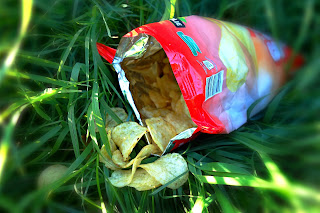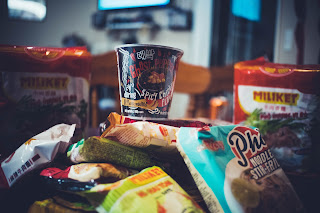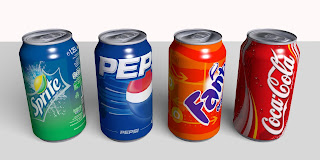Packaged Food- Guidelines, Healthy eating And Selection Tips
Your body will consume any Food you put in it and deal with it as best as it can. However, Some Food are good, and others, not good at all.
The real health concerns over what foods to consume is not going to be a big debate today, except to say that everything that we put in our mouth will either do us good, or not good. There are mainly two types of food Available;
Real Natural Foods - They are Untouched or modified (straight off the tree/ in natural state)
Packaged Foods - They are processed, packaged and modified Food items.
In today's busy age more than 70% people diets consists of;
- Chips
- cookies
- rice crackers
- cup cakes
- donuts
- confectionary and chocolate bars
- candy and sweets
- pre made meals and instant noodles
-Frozen foods
- Fast Foods
- soft drinks / soda pops / carbonated beverages
- juices / fruit drinks / pre-squeezed fruit and vegetable juices
- beers / wines
Now the question is - where is the real food in it? Where are the fruit and veggies? Is this your staple diet?
Watch your body on how it react when eating packaged foods, and watch how your body acts after you eat natural foods. There is a big difference because;
There is an element that affects how fast we digest our foods through our bodies, called Glycemic Index (GI for short). The higher the Glycemic index, the faster our body digests and processes food in our body. If you have heard the term Low GI food, it is food that is slowly processed and gives a slow release of energy. On the other hand, a "High GI food" gives you an almost instant pick up of energy, processes fast, and then you "fall flat" and you are out of energy. Even some natural foods have a high Glycemic index. BUT, the majority of packaged foods have high GI.
If you eat a packet of potato crisps, you may feel satisfied for a short while, and then you are probably empty and "unsatisfied" a short while later. That is because they usually lace the chips or snack with salts and flavours that make you want more.
Instead of snacking on packaged foods, choose a natural alternative. This could include nuts, dried fruit, grapes, fruit, and yoghurt. You will be satisfied, and you will feel better for it. You won't feel flat, and on the other hand you are doing your body good, not filling it with junk foods.
Packaged foods are mixed. Some are "healthy" , some are not. You have to be careful even if they are labelled healthy. So you may wonder Are they really healthy? Do they have chemical flavour enhancers such as MSG, preservatives, or pH balancers? Do they have swags of laboratory numbers on the ingredients list? Or really, really long words that only your doctor or chemist would understand? If so, then you should do some research, find out what they really stand for, and avoid foods that contain them. This can be a little difficult - especially if you have kids. It's that "No" word. Just make healthy alternative choices instead.
For instance, Take an apple. - If your kids can't eat a whole apple, cut it up into smaller sizes, they are more likely to eat it. Make eating these things fun. You get excited about eating healthy, and your kids will follow.
As you can see, there are major differences between packaged foods and natural foods. As a rule, if it comes in a packet, it has to be preserved. Natural foods have a shelf life, and go off. That is the natural order of life. If a packaged food can sit on the shelf and not go off, decay and decompose, then it is not food, and is probably doing you more harm than good.
The following guidelines are here to help you make the most out of packaged foods.
1. Always read nutrition labels
Reading nutrition labels may be time-consuming but it is the only way you can check on all the ingredients lurking in your packaged foods. You may do nutrition label-reading if you have leisure time and just stick to the healthy brands later on.
The ingredients which are notorious for being excessive in packaged foods are salt, sugar, fats and preservatives while the healthy ones which are either absent or deficient are fiber and nutrients. Also deserving your attention are the serving sizes and number of servings per pack.
2. Keep in mind the following numbers of important ingredients when shopping
- 3 grams-the recommended fiber content per serving
- 13 grams-the maximum amount of fats per serving
- 30 grams-the maximum amount of sugar per serving
- 500 mg-the maximum amount of sodium per meal
Also, Be familiar with the terms used for added value.
Here is a sort of glossary on the commons indicators of nutritional value;
- Fortified, enriched/filled-This means the food is enriched with nutrients or externally nutrients is added to the food substance. This is how protein of any substance can be increased.
- single-serving-This means that the portion is already controlled for you, thus reducing your chances to overeat.
- whole-grain-This means grains which are simply mechanically ground and not chemically treated. Food is thus high in fiber and nutrients. It is healthier than refined grains.
- organic-This means the food is sourced from organically-grown plants and animals devoid of fertilizers, pesticides and hormones.
Just as there are terms which indicate nutrition, there are also terms which connote potential hazards to health.
- Hydrogenated, shortening-This refers to oils which have been treated with heat and chemicals in order to extend shelf life. Trans fats are inevitably formed, leading to cardiovascular and other health problems.
- Refined and bleached-These terms are commonly used in conjunction with flour and oils. Whole wheat flour, for instance, is refined and bleached in order to come up with longer shelf-life breads which are whiter and softer but are stripped of much of its nutrients and fiber.
- strange-sounding names- The unknown trace substances printed on food labels are usually preservatives, artificial colors and flavors. The more a packaged food contains these chemicals, the less healthier it is.
4. Consciously restrict the amount of packaged foods you eat
Schedule it. Perhaps you may schedule Mondays, Wednesdays and Fridays for cooking with packaged foods. All the other days should be filled with fresh, nutritious foods.
5. Limit it
Some nutritionists recommend consuming no more than 1 serving of packaged food per member of the family per day. Having a conscious mindset to control packaged food consumption is the only way you can really limit the consumption of fresh foods.
Most packaged food contains excessive amounts of salt and sugar, and a long list of preservatives, artificial flavours and colouring, which if consumed regularly in even moderate amounts, is ultimately detrimental to your overall health. Though you won't starve.. you just won't be nearly as healthy as you would if you had maintained a natural, healthy diet.
- Salt
For instance, it is a well-established fact among most nutritionists that the average adult shouldn't consume more than 1 teaspoon of salt per day... total. Take a can of soup, for instance. The 'Nutrition Facts' label lists "Sodium" (for our purposes here, equivalent to salt) as 25%. This means if you were to consume 1 cup of the prepared soup, you will have used up 25% of your salt quota for the whole day with the soup alone.
If you have a small bag of potato chips, and/or many other packaged foods and snacks, you're likely well past your daily quota of salt before you even get to dinner time.. not to mention the salt you might add to your dinner meal (especially if it's packaged food). All this over-consumption of salt eventually leads to health problems, such as heart disease. You could avoid these problems if you kept your salt intake to below the recommended levels.
- Sugar
Although it makes packaged food and soft drinks tasty, it comes at a high cost, health-wise. Refined sugar has absolutely no nutritional value whatsoever. It's loaded with empty calories. Not only that, if you continue to consume sugary products, you send your metabolism into high alert. While each of us has a different metabolic rate (the conversion of food nutrients into glucose, or blood sugar - your body's energy source), in general.. your body can't deal with continuously elevated amounts of refined sugar without being forced to create more insulin, to control your metabolic rate.
Metabolism is intended to be a slow process, to allow energy to be delivered at a regular rate, so that you always have some energy in reserve. Natural foods such as fruits, vegetables, beans and grains have built-in natural sugars which take much longer to break down than refined sugar.
With refined sugar you get a sugar fix, which gives you a quick burst of energy, followed by an even faster sugar withdrawal. If you repeat this scenario over and over again, day after day, your body will no longer be able to produce enough insulin. You're well down the road to diabetes.

























12 Comments
Extremely useful information which you have shared here about Servr Hotels for us .This is a great way to enhance knowledge for us, and also beneficial for us. Thank you for sharing an article like this.
ReplyDeleteThis article contains a lot of valuable info about Maintenance Jobs in Northwest Ohio. I am amazed by the quality of the info and also it is a beneficial article for us, Thanks for share it.
ReplyDeleteYou are providing good knowledge. It is really helpful and factual information for us and everyone to increase knowledge. about Storage Spaces For Rent .Continue sharing your data. Thank you.
ReplyDeleteThis comment has been removed by the author.
ReplyDeleteVery informative! If you're looking to relocate, Gurgaon Packers Movers, packers and movers sector 49 Gurgaonoffers expert assistance for a hassle-free move.
ReplyDelete
ReplyDeleteSindoor Packers and Movers now offer a modern storage facility in Meerut designed to meet both personal and business storage requirements. Short-term or long-term, we’ve got the right space for you.
Sindoor Packers and Movers offers professional Packers and Movers from Delhi to Pune services, ensuring safe, fast, and affordable relocation. Whether it's household items, office goods, or vehicles, we handle everything with care and precision. Trust Sindoor Packers and Movers for a smooth, hassle-free moving experience from Delhi to Pune.
ReplyDeleteGrewal Transport makes home relocation easy with professional House Shifting Services in Coimbatore. Our commitment to timely delivery and safe handling sets us apart in the moving industry.
ReplyDeleteElevate your commercial presence with a strategic Commercial Property for Sale in Sector 82. Sindoor Property Real Estate offers professionally curated options ideal for savvy investors and business owners.
ReplyDeleteRehousing Packers And Movers From India to Dubai. We specialize in international moving, ensuring safe packing, customs clearance, and secure transportation of your belongings. Our experienced team handles every aspect of the move with professionalism and care. Whether it’s household goods or office equipment, we deliver on time with complete transparency. Trust Rehousing Packers and Movers for a smooth, stress-free international relocation experience.
ReplyDeleteSindoor Property Real Estate has established itself as one of the most respected dwarka expressway property dealers, trusted for fair deals and honest guidance.
ReplyDeleteCustomers choose us because Gati House Shifting Packers and Movers offers safe, reliable, affordable, and quick relocation Packers and Movers Company in Gurgaon. Our experienced team, premium packing, modern equipment, and customer-focused approach ensure a seamless moving experience—every time, for every client.
ReplyDeleteIf you have any doubts , please let me know